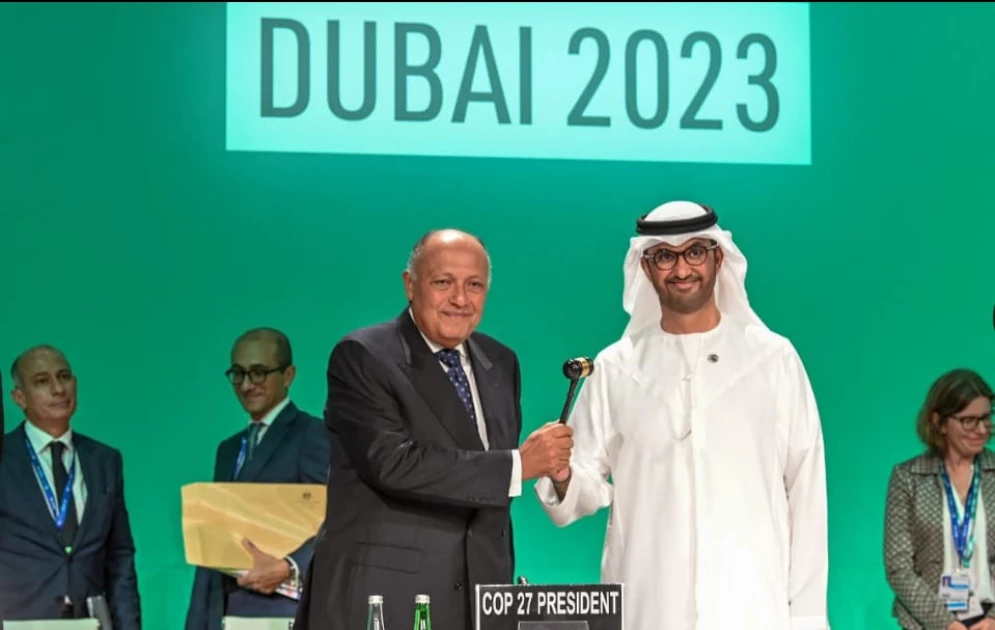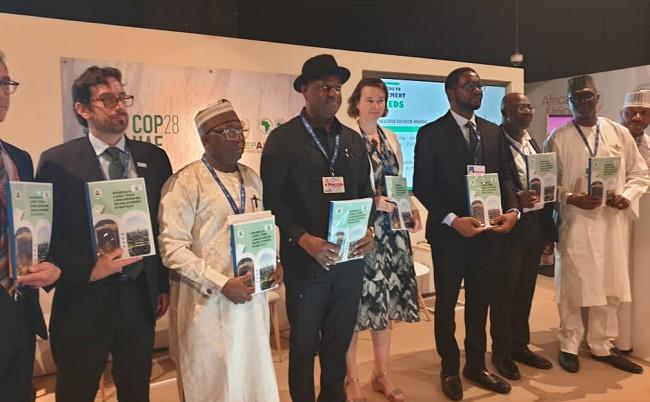Amidst the global unprecedented challenges, ranging from economic hardship, military takeover in some parts of Africa, Russian-Ukraine and Israel-Gaza wars, conversation continues on the “war” of nature against man – the Climate change. This is as a result of the intended and unintended actions of man against the environment.
Climate change has not only posed threats to human and animal environment, it is a major contributor the food insecurity, and the inter-community and violent conflicts globally and the Sahel region in particular leading to human and animal displacements caused by sea level rise, degradation, drought, erosion, flooding and desertification.
The National Climate Change Policy (2021-2030) asserts that “Climate change is a complex environmental problem because of its long-term uncertain timeframe, scales of occurrence, differential impacts and vulnerabilities, as well as equity and justice within the global power asymmetries.”
No doubt, the climate change issues continue to take the center stage, due to the threats that the change in the climate continues to contribute to the global economic and environmental narratives. The rapid changes in climate have been modeled at multiple levels, including impacts on one of the most fundamental human rights: food.
While Food and Agricultural Organization of the United Nations explains that “food security exists when all people, at all times, have physical and economic access to sufficient, safe and nutritious food that meets their dietary needs and food preferences for an active and healthy life”, sadly, the narrative is not so in Nigeria and Sahel region by extension because of the contentious issues between the farmers and headers caused by drought cum the insecurity that has kept framers out of their farmlands thereby leading to poverty.
The Policy Approach
In 2021, the Climate Change Act, 2021 was enacted by the 9th National Assembly followed by an assent by Nigeria’s former President, Muhammadu Buhari. The policy has been identified as one of the most significant means to address the effect of climate change in Nigeria. Similarly, there is National Climate Change Policy (2021-2030) and several related policies to addressing climate and environmental threats.
However, it is no doubt that the implementation of the Act and other policies has not been well considered and planned by the key stakeholders within the government for the common good of Nigerians. The Act can be said to be a right method, if properly implemented in mitigating some of the existing realities before us.
The commitment taken by former President Muhammadu Buhari at the United Nations Framework Convention (UNFCCC) as well as the inauguration of the National Council on Climate Change, and the prioritized plans on how to effectively respond to the impacts of climate change in Nigeria among other can be said to be commendable, but there is a clear-cut need for stakeholders’ continuous advocacy for the full implementation of the Act.
The Subnational Readiness
According to the recently launched report by the Society for Planet and Prosperity, it reveals that only two states have climate change laws in Nigeria. These are Rivers State and Ebonyi State. And only seven (7) states in Nigeria have climate policy documents (that could be found online). These include Cross River, Delta, Ebonyi, Lagos, Osun, Rivers, and Yobe. Similarly, according to the report, only twelve states and the FCT have climate change action plans. These include Nasarawa, Yobe, Jigawa, Kaduna, Anambra, Ebonyi, Bayelsa, Cross River, Rivers, Lagos, Osun and Ondo.
The report also revealed that the analysis of the 2023 budget shows that only eight (8) states have an explicit climate provision in their budget. These include Nasarawa, Plateau, Yobe, Jigawa, Anambra, Ebonyi, Ondo and Ogun. While on the issue of awareness, the report revealed that climate awareness is driven more by the activities of NGOs and civil society groups than by the state government.
Despite the heavy funding that goes to states from the Ecological fund by the federal government, it appears that little or no effort is being made by the subnational government in addressing flood issues which is one of the major impacts of climate change. According to a PUNCH report, “36 states of the federation shared N300bn allocation from the Ecology Fund from 2017 to 2022”. The Ecological fund is an intervention fund by the Federal Government to address the multifarious ecological challenges in various communities across the country.
The perceived misappropriation of the ecological fund by the subnational government, state government especially is a hint to how issues of climate change may be significantly addressed at the state level. This is not without exception to states that have taken ecological challenges seriously.
Other Challenges
In Nigeria, the lack of political willpower is a major challenge to the implementation of government policies. This is followed by poor awareness of the citizens who are directly affected by socio-economic challenges. Similarly, funding is critical to the implementation of government policies, however, poor funding often characterize activities of government.
Where little funding may be made available, the perceived corrupt practice in government institutions has in no measure inhibited the smooth and proper implementation of polices and projects, climate change issues without exception.
The near dead state of local government administration in Nigeria is a major contributor to the avoidable impact of climate change moat especially at the grassroot level. The elementary roles of the local government as the closest governance structure to the people has been “taken away” due to poor funding and political subjugation by the state governors.
President Tinubu and His Political Will
At the 2023 United Nations General Assembly, President Bola Tinubu posited that “climate change severely impacts Nigeria and Africa. Northern Nigeria is hounded by desert encroachment on once arable land. Our south is pounded by the rising tide of coastal flooding and erosion. In the middle, the rainy season brings floods that kill and displace multitudes.” Speaking from the African lens, he opined that “African nations will fight climate change but must do so on our own terms. To achieve the needed popular consensus, this campaign must accord with overall economic efforts.”
He added that “In Nigeria, we shall build political consensus by highlighting remedial actions which also promote economic good. Projects such as a Green Wall to stop desert encroachment, halting the destruction of our forests by mass production and distribution of gas burning stoves, and providing employment in local water management and irrigation projects are examples of efforts that equally advance both economic and climate change objectives. And that “Continental efforts regarding climate change will register important victories if established economies were more forthcoming with public and private sector investment for Africa’s preferred initiatives.”
Similarly, in the address by President Bola Tinubu at the 2023 Cabinet Retreat for Ministers, Presidential Aides, Permanent Secretaries and top government functionaries on November 1, 2023, he maintained that “we have challenges in the Sahel, we have challenges of climate change, south and north of Nigeria is battered, with ocean surge, we have desert encroachment in the north, but we are still blessed with arable lands. We can do it; we can build our country.”
Also, at the presentation of the 2024 Annual budget at the National Assembly, President Tinubu stressed that “as we approach the COP28 climate summit, a pivotal moment for global climate action, I have directed relevant government agencies to diligently work towards securing substantial funding commitments that will bolster Nigeria’s energy transition. It is imperative that we seize this opportunity to attract international partnerships and investments that align with our national goals. I call upon our representatives to engage proactively to showcase the strides we have made in the quest to create an enabling environment for sustainable energy projects.
“Together, we will strive for Nigeria to emerge from COP28 with tangible commitments, reinforcing our dedication to a future where energy is not only a catalyst for development but also a driver of environmental stewardship,” he said.
The re-echoed position of the President on climate change may be said to be a clear indication of his interest and readiness in addressing the challenges of the climate change in Nigeria and perhaps setting a tune for the African continent. However, one cannot but worry about what may become of his intention due to the “institutional deficiencies” by the Ministries Departments and Agencies (MDAs) whose principal responsibilities is to combat environmental challenges. Irrespective of the worry, it is the responsibility of the president to drive and demand for accountability.
The Way Forward
In addressing the challenges of climate change in Nigeria and Africa by extension, there is a need for strategic support of stakeholders at the national level on the speedy domestication and implementation of the Climate Change Act 2021 which will in no measure aid collaboration and advocacy towards the effective implementation of the Act most especially at the sub national government.
Similarly, there is a need to et the framework for mainstreaming climate change action, carbon budgeting and the operationalization of the National Council on Climate Change. There is a need to create an improved knowledge base and awareness level regarding climate change mitigation and adaptation. The existing knowledge gap with respect to Climate Change is an area that essentially needs to be tackled before the Climate Change Act (2021) can live up to its mandate. And at long run will help to promote and demand accountability and transparency.
Knowledge, either derived from formal or informal systems, drives actions. To this end, it is vital for citizens to be made aware of the adverse impacts of climate change, more from a personal impact viewpoint. This would help in developing actionable plans for its mitigation.
It is important to state that the Climate Change Act cannot operate in a vacuum. There is a need for concerted efforts by government Ministries Departments and Agencies, private sectors, and CSOs towards its achievement. Additionally, there is a need for a wider reach, the Act also called for the incorporation of climate change discourse in the school curriculum from the basic level up until the tertiary level of education.
The Civil Society Organizations (CSOs), media and other pressure groups should ensure adequate checks on the commitments of governments to ensure their mandate are carried out. There is a need for indigenous research and, local technologies strategies to address issues of climate change based on community peculiarities. The private sector actors and the Small and Medium Enterprises (SMEs) can play a great role in combating climate change. As such, there is a need for a coordinated approach in engaging them, hence they are part of the major contributors to carbon emissions.
Olaogun Michael Sunkanmi, a policy analyst and development practitioner wrote from Abuja.
Contact: [email protected]





